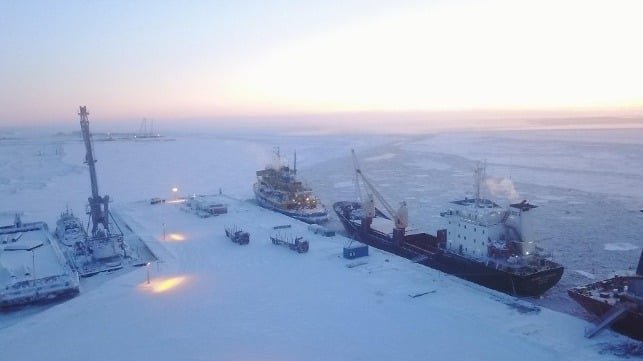Despite Sanctions, Russia's Arctic LNG 2 Plant is Up and Running

With extensive help from Chinese interests, Russian gas producer Novatek is making headway in its efforts to circumvent Western sanctions on its Arctic LNG 2 plant in the Siberian Arctic.
The remote Arctic LNG 2 facility was designed to be assembled at a large shipyard in three sections, each built on floating concrete pontoons. One by one, the pontoons would be towed into place at a terminal on the Gulf of Ob, then permanently sunk to rest on the bottom of a specially-prepared berth. This plan was moving smoothly until 2022, when Russia invaded Ukraine and the west imposed stringent sanctions on the plant's construction. Train 1 was installed in 2024, but Train 2 was delayed because of export bans on key parts from Western suppliers. The second train finally started operations just last month.
China's government (through state-owned enterprises) holds a 20 percent share in Arctic LNG 2. At present, Chinese gas companies are the plant's only customers, drawn by discounted prices - and undeterred by the threat of American sanctions.
This week, the LNG carrier Arctic Vostok arrived in Beihai and offloaded Arctic LNG 2's seventh cargo. As the winter ice season approaches in the Russian Arctic, it may be among the last this year, but that has not stopped Novatek from reaching for new records. On Wednesday, Bloomberg reported that the plant averaged 18 million cubic meters of gas liquefaction per day during September, about 14 percent above the previous record. The surge may be short-lived, as Arctic LNG 2 will have to shut down when the eastbound navigation season is over.
Novatek had planned to create a wider seasonal window for shipping Arctic LNG 2's product by building a fleet of icebreaking LNG carriers, as it did to enable exports from the neighboring Yamal LNG terminal. Sanctions scuttled this project as well: South Korean shipbuilder Samsung Heavy Industries paused work on a joint 15-ship construction venture with Russian yard Zvezda in February 2022, as soon as Western restrictions began to kick in. Zvezda retaliated by canceling the project and filing a lawsuit, and SHI reciprocated by terminating the contract. Without Korean assistance, the pace of construction at Zvezda has languished, and none of the ships in the series have yet entered commercial service. The first, Aleksey Kosygin, began sea trials this year but was back in drydock again by mid-July, according to Arctic consultant Ben Seligman.
